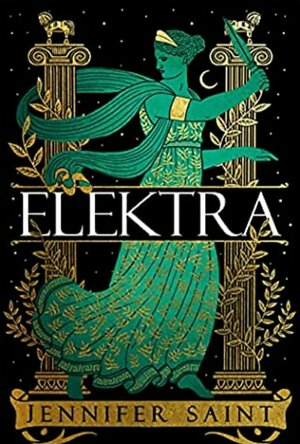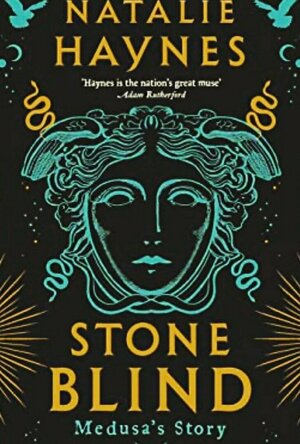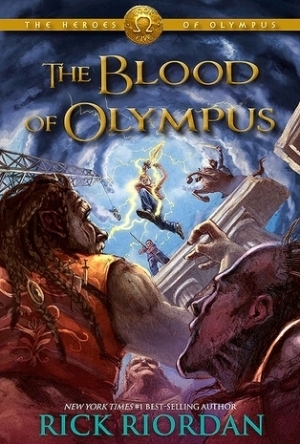Elektra by Jennifer Saint is told from three female perspectives: Clytemnestra, the sister of Helen, the wife of Agamemnon; Cassandra, a Princess of Troy; and Elektra, Clytemnestra and Agamemnon’s youngest daughter.
The things these women had to put up with! Clytemnestra’s husband Agamemnon, acts like a madman (but it’s ok, it’s all for the Gods!) and she’s supposed to accept it all. Except she doesn’t.
Cassandra is treated like a madwoman after she’s cursed by Apollo. She can tell the future, but no-one believes her. So they only have themselves to blame when Troy is destroyed.
And then there’s Elektra. She seems to have fully bought into the whole “men/ daddy knows best, and anyway, he’s a hero” story. She’s a young woman who adores her father and believes he can do no wrong. She can’t understand her mothers reaction to the sacrifice of her eldest daughter and Elektra’s sister. Can we blame Elektra though? Probably. She certainly knows how to play the long game.
The narrators were well chosen, and really helped to add life and vigour to the characters of the three women. Listening to these Greek myths haas added something extra special to the stories - after all, I’ve read these stories so many times over the years in different forms. And I still can’t see a time where they’ll get old. In every retelling there’s a different angle, and I don’t think I can express enough how much I enjoy the story told from the women’s points of view.
Elektra is just fabulous - a timeless story about strong women.
ClareR (6067 KP) rated Stone Blind in Books
Jan 24, 2023
I loved how the stories of Medusa, her sisters and Perseus were woven together so that we get a rounded view of the story. Medusa’s sisters, the Gorgons Sthenno and Euryale are seen as more than just monsters. They are given personalities and feelings - they care for their little sister Medusa, and nurture her from a baby into a young woman.
But Sthenno and Euryale aren’t there when Medusa is raped by Poseidon. And this is where we’re introduced to Medusa as victim. She’s never normally portrayed as a victim, even when Perseus decapitates her, but Haynes has turned this story on its head. And I’m most definitely here for all that!
To match the new Medusa, we have a new Perseus. He’s an accidental hero. He just wants to save his mother the only way he can - but he needs a lot of godly interventions and help. He’s a bit brainless, if I’m honest!
I’ve always thought that the Gods were petty, and their constant bickering with one another in this book just reinforces this - I really liked how they argued, fought and tried to ge tone up on one another.
And the ending was as emotional as only a sentient, decapitated head could be. Poor Medusa. Still used as a tool for men’s pleasure, displeasure and anger.
I’m eagerly awaiting whatever comes next from Natalie Haynes, because this book was outstanding.
Andy K (10823 KP) created a post in Movies are the shiz!
Apr 7, 2018
Awix (3310 KP) rated The Gorgon (1964) in Movies
Feb 10, 2018 (Updated Feb 10, 2018)
Well-directed in parts, with some good imagery and set piece scenes, but the movie struggles to give the cast the material they deserve and the meandering and repetitive storyline can only charitably be described as a plot. All a bit bleak and cheerless; inevitably comes across as slightly misogynistic too.
Mark @ Carstairs Considers (2482 KP) rated The Blood of Olympus (The Heroes of Olympus #5) in Books
Mar 9, 2018
With so much happening, there is little time to backtrack and bring new readers into the story. However, longtime fans will be richly rewarded with the wonderful storytelling here. The plot moves quickly between the two sets of characters and builds to an impossible to put down climax. The characters we love continue to grow as well. It’s hard to say goodbye to these great characters, but this is a great end to an epic series.
Read my full review at <a href="http://carstairsconsiders.blogspot.com/2015/01/book-review-blood-of-olympus-by-rick.html">Carstairs Considers</a>.
His previous novels - <i>Ship of Rome</i>, <i>Captain of Rome</i> and <i>Masters of Rome</i> all concerned the Roman navy during the first Punic war against Carthage. While this novel is not part of that series, it also has another unusual setting: this time, that of the Spanish Armada.
While it does have an unusual setting, it also shares some similarites with those other books: again, the main protaganist of the novel is an outsider, this time a loyal Recusant (or practising, secret, Catholic) in the English navy compared to the Greek captain in the Roman navy of the <i>Masters of the Sea</i> series. Again, a large chunk of it takes place on sea, rather than on land. Again, it is an enjoyable read.
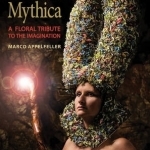
Flora Mythica: A Floral Tribute to the Imagination
Marco Appelfeller and Hing Ang
Book
In Flora Mythica floral designer Marco Appelfeller and photographer Hing Ang team up to create a...
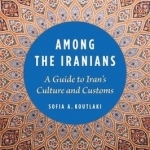
Among the Iranians: A Guide to Iran's Culture and Customs
Book
The eyes of the world are on Iran, from nuclear issues to women's rights to Iran's perspective on...
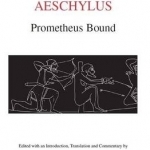
Aeschylus: Prometheus Bound
Book
The play's title figure has long held a central place in the 'libertarian' stream of Western...
Method of Medicine: v. II, Bks. 5-9
Galen, Ian Johnston and G.H.R. Horsley
Book
Galen of Pergamum (129--?199/216), physician to the court of the emperor Marcus Aurelius, was a...
